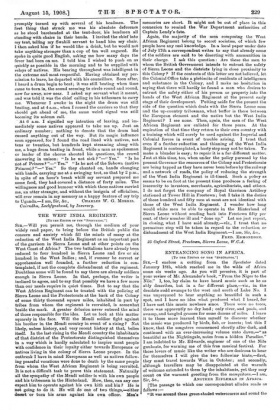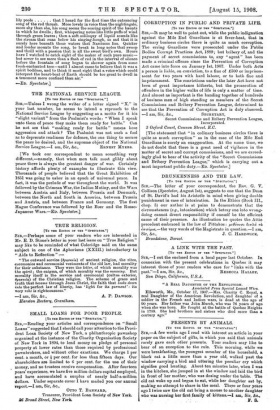ENTRANCING SONG IN AFRICA.
[To THE EDrrOR Or TUB 013:mo-rare:LI enclose a cutting from the Spectator dated January 18th, which reached me in the wilds of Africa some six weeks ago. As you will perceive, it is part of your review of Mr. Alexander's book, "From the Niger to the Nile." I, too, lay claim to have heard music such as he so ably describes, but in a far different place,—viz., in the desolate sudd swamps to the west and south of Lake No. I
• was unprepared to hear anything so beautiful in such a spot, and I have no idea what produced what I heard, for I have met this music nowhere since. There were no trees, there was apparently no dry land ; only river, and pools, and swamp, and tangled grasses for some dozens of miles. I leave it to those more learned than myself to discover whether the music was produced by birds, fish, or insects; but this I know, that the songsters commenced shortly after dark, and continued with an ever-increasing volume unto dawn,—" as beautiful as the Nightingale, notes from a hidden Paradise." I am indebted to Mr. Edwards, engineer of one of the Nile gunboats, for warning me of this free musical festival. For those lovers of music like the writer who are desirous to hear for themselves I will give the two following hints,—first, they must travel towards Wau in October; and secondly, although travellers may be disappointed at the warmth of welcome extended to them by the inhabitants, yet they may count on the warmest greeting from the mosquitoes.—I am,
Sir, &c., ANOTHER RIFLEMAN IN AFRICA. [The passage to which our 'correspondent alludes reads as folloWs-:—
"It was around then green-shaded watercourses and round the lily pools that I heard for the first time the entrancing song of the red thrush. More lovely in voice than the nightingale, more shy than she, his song seems the soaring spirit of the haunts in which he dwells ; first, whispering notes like little puffs of wind through green leaves; then a soft soliloquy of liquid sounds like the stream that runs below his singing-bough, so sad that it is surely here beneath these waters that Narcissus lies. Quicker and louder mounts the song, to break in long notes that swoop and thrill with a passion that is all the sweet bird's own. Hours have I watched to catch sight of the maker of such pure music— but never to see more than a flash of red in the interval of silence before the fountain of song began to shower again from some fresh-enchanted tree—until I almost came to believe that it was a spirit bodiless, and to think it most right that a voice which could interpret the heart-beat of Earth should be too great to dwell in a tenement more confined than air."
Spectator.]







































 Previous page
Previous page